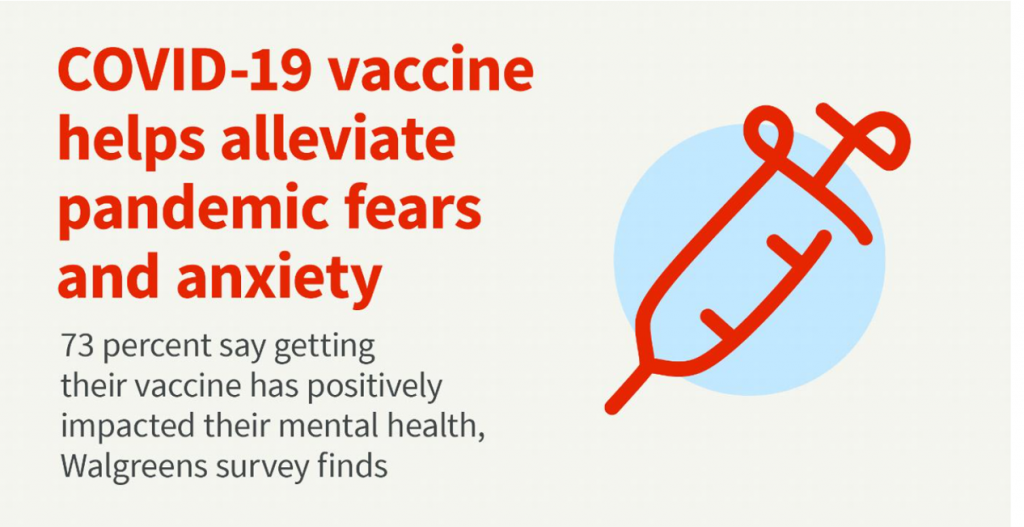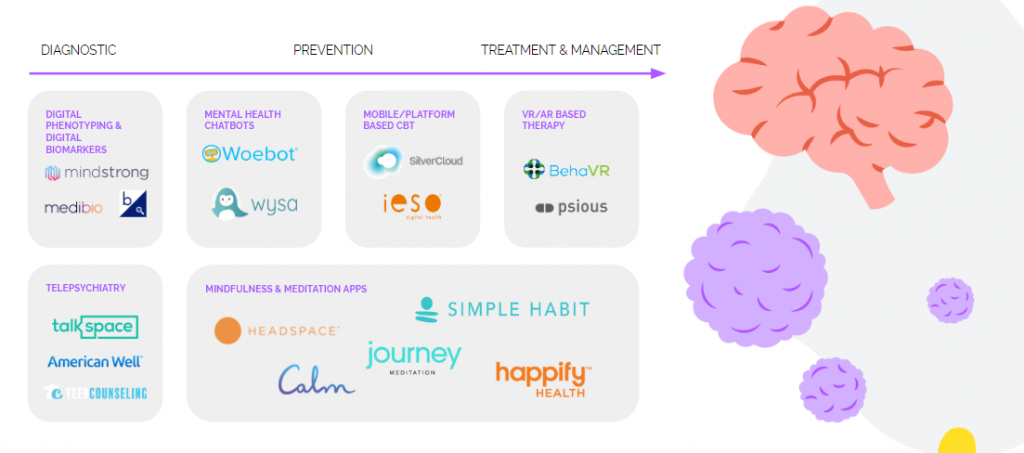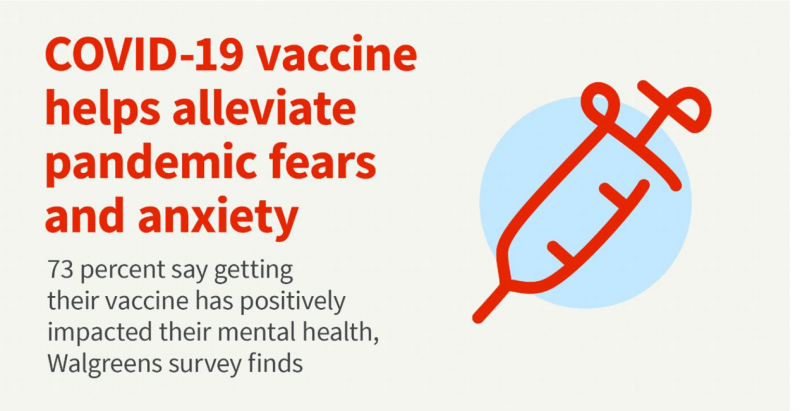Most people in the U.S. who have received at least one COVID-19 vaccine shot have a welcoming side-effect: peace of mind and mental health, according to a survey conducted by Walgreens in April 2021.

Three in four people said that getting vaccinated positively impacted their mental health, feeling some kind of relief, thankfulness, or optimism, among other sentiments.
Walgreens conducted the poll online among 1,500 U.S. adults over 18 years of age between April 19 and 21st, 2021.
The activities people are most excited to do once vaccinated with full immunity are to see family and friends (among 60% of people), dining out and traveling.
Twenty-nine percent of Americans said they had mixed feelings about getting vaccinated, but decided doing so was, “the best/right thing to do.” This group of hesitant vaccine consumers were:
- 60% women
- One-half under 40 years old
- Mostly getting the vaccine to help protect other people
- More likely to take limited risks during the pandemic compared with other health citizens.
Walgreens, like other retail pharmacies, is playing a large role in getting the vaccine and “shots in arms” closer to people in their local communities. To combat vaccine hesitancy, Dr. Fauci and others have supported the deployment of “trusted messengers,” discussed by Surgeon General Dr. Vivek Murthy here on NPR.
To that end, Walgreens is partnering with the musician John Legend on a COVID-19 vaccine initiative in a series of videos in conversation with a Chicago-based Walgreens pharmacist, Dr. Stephen Fadowole (who is also a big fan, he tells John).
Here’s John asserting that, “this is our shot,” bringing communities back together, providing healing for all, reconnecting with the ones we love and the world we lost, he explains.
Walgreens has also launched a ride service with Uber to get people to their vaccinations at the retail pharmacy. Not to be outdone by John Legend, the director Spike Lee is partnering with Uber to promote vaccinations on the “our block, out place, our people” campaign. Consumers can donate rides to fellow patients via the Uber app, as Spike talks about here.
Health Populi’s Hot Points: On May 7th, the New York Times published an article titled “Therapy on Aisle 7” about retailers entering the mental health care services market — what the paper cheekily coined as “the new retail therapy.”
The piece explains that, “Finding a therapist can be a tough and time-consuming process involving multiple phone calls, waiting lists and insurance hurdles. But what if you were able to walk into your corner drugstore for a bottle of shampoo and also had the option of scheduling a walk-in session for mental health treatment?” citing examples of CVS, Walmart and, Walgreens as well and new entrants into this fast-growing retail health segment beyond urgent care.
Just last week, Walmart announced its acquisition of the telehealth company MeMD, which provides both medical/physical and mental health visits to several million consumers in the U.S.
A recent report from the U.S. General Accounting Office (GAO) noted a deficit of mental health providers throughout the U.S., with growing demand — accelerated during the pandemic’s toxic side effects of anxiety, stress, and depression. The GAO cited data that as many as 4 in 10 people in the U.S. reported anxiety or depression during the coronavirus pandemic, versus 1 in 10 people at the beginning of 2019.
 Telehealth and virtual care options for mental and behavioral health are fast-expanding and receiving large investments, with the retail health ecosystem providing trusted on-ramps to these services as well. Our friends at Health XL curated this market landscape graphic which points out the different flavors of digital mental health already available in the pandemic era.
Telehealth and virtual care options for mental and behavioral health are fast-expanding and receiving large investments, with the retail health ecosystem providing trusted on-ramps to these services as well. Our friends at Health XL curated this market landscape graphic which points out the different flavors of digital mental health already available in the pandemic era.
Our vaccinations may well be buoying our spirits in the immediate term, Walgreens reminds us. But the pandemic will have longer-term mental health impacts for many people who will need and want to access convenient, accessible, affordable options for dealing with mental wellbeing. Mind this space: it is fast-evolving and serving unmet needs that were already in short-supply before we knew how to spell “coronavirus.”





 I am so grateful to Tom Lawry for asking me to pen the foreword for his book, Health Care Nation,
I am so grateful to Tom Lawry for asking me to pen the foreword for his book, Health Care Nation,  I love sharing perspectives on what's shaping the future of health care, and appreciate the opportunity to be collaborating once again with Duke Corporate Education and a global client on 6th May. We'll be addressing some key pillars to consider in scenario planning such as growing consumerism in health care, technology (from AI to telehealth), climate change, and trust -- the key enabler for health engagement or dis-engagement and mis-information. I'm grateful to be affiliated with the corporate education provider
I love sharing perspectives on what's shaping the future of health care, and appreciate the opportunity to be collaborating once again with Duke Corporate Education and a global client on 6th May. We'll be addressing some key pillars to consider in scenario planning such as growing consumerism in health care, technology (from AI to telehealth), climate change, and trust -- the key enabler for health engagement or dis-engagement and mis-information. I'm grateful to be affiliated with the corporate education provider  Thank you FeedSpot for
Thank you FeedSpot for